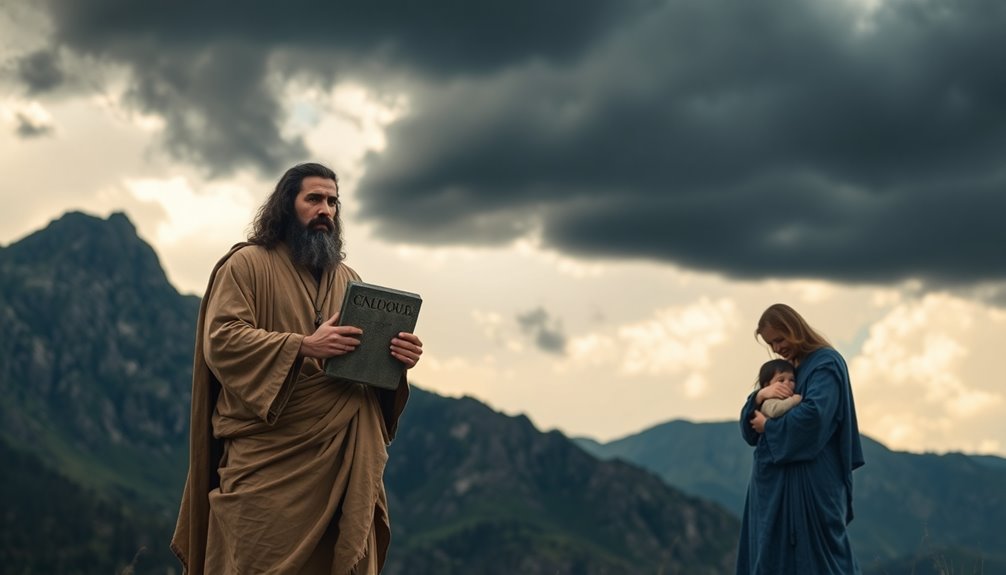God sought to kill Moses because he failed to circumcise his son, Gershom. This neglect meant he wasn't honoring a vital covenant obligation established by God, marking the family's commitment to divine laws. Circumcision was more than a ritual; it represented Moses' dedication to God's commandments. By neglecting this duty, Moses jeopardized his mission and leadership. It's a stark reminder that even small commandments carry significant weight. Fortunately, Zipporah intervened, restoring their covenant relationship. This incident underlines the importance of obedience and responsibility in parenting, raising questions about spiritual commitments that could be explored further.
Key Takeaways
- God sought to kill Moses due to his failure to circumcise his son, Gershom, a critical covenant obligation.
- Circumcision is a vital sign of commitment to God's covenant, marking the identity of Hebrew males.
- Moses' neglect of this command threatened his leadership and raised questions about his fidelity to God's laws.
- Zipporah's urgent intervention reinstated their covenant relationship, emphasizing the seriousness of covenant responsibilities.
- This incident underscores the importance of personal obedience for leaders in guiding the faith of their families and communities.
Introduction

In the journey of faith, there are moments that challenge our understanding of divine intentions, and one such moment occurs in Exodus 4:24-26, where God seeks to kill Moses. This alarming incident brings to light the critical importance of obedience to God's commands, especially regarding covenant signs like circumcision. God intended to hold Moses accountable for failing to circumcise his son, Gershom, a serious oversight that could jeopardize his role as a leader of the Israelites.
As you delve into this scripture, you might wonder why God would threaten Moses, a chosen servant, with death. The answer lies in the covenant established with Abraham, emphasizing the need for compliance with God's laws.
Zipporah, Moses' wife, recognizes the urgency of the situation and acts swiftly to circumcise their son with a flint knife. Her intervention highlights not only her understanding of the gravity of this act but also the dire consequences of disobedience.
This encounter serves as a powerful reminder that personal obedience to God's law is essential, especially for leaders like Moses, who bear the responsibility of guiding others in faith.
Moses' Covenant Obligation Highlighted

When you look at the story in Exodus 4:24, it's clear that God's intention to kill Moses underscores the critical nature of covenant obligations.
Moses' neglect of circumcising his son reflects a serious lapse in adhering to God's commands, which are vital for his role as a leader.
This incident serves as a powerful reminder that even small commandments carry significant weight in our spiritual responsibilities.
Primary Bible References
The biblical account in Exodus 4:24-26 highlights a critical moment where God sought to kill Moses due to his failure to circumcise his son, Gershom. This act of neglect was more than a simple oversight; it represented a significant breach of covenant obligation essential to the identity of Hebrew males.
Circumcision, established as a sign of the covenant with Abraham's descendants, served as a clear marker of belonging to God's chosen people. By not circumcising his son, Moses risked being cut off from that divine promise.
Moreover, this incident revealed a profound hypocrisy. How could Moses, chosen to lead the circumcised Hebrews, have an uncircumcised son? The urgency of the situation became clear when Zipporah, recognizing the danger, quickly circumcised Gershom with a flint knife.
Her declaration of Moses as a "bridegroom of blood" emphasized the importance of adhering to God's commands. This event serves as a crucial lesson: personal adherence to God's laws is vital for leaders.
Before undertaking divine missions, fulfilling covenant obligations isn't just recommended; it's essential.
Secondary Bible References
Moses' failure to circumcise his son not only puts his life at risk but also highlights a deeper issue regarding his covenant obligations. This act of neglect directly invites God's wrath, leading Him to try to kill Moses.
In the context of the covenant established with Abraham, circumcision serves as a vital sign that every Hebrew male must uphold to remain included among God's people. When Moses overlooked this responsibility, he jeopardized not only his leadership but also his family's identity as Hebrews.
The urgency with which Zipporah circumcises their son emphasizes the critical nature of adhering to covenant practices. This incident raises significant questions about Moses' commitment to God's commandments. By failing to fulfill these obligations, Moses risks being seen as no different than the Egyptians, highlighting the importance of separation between God's people and others.
Ultimately, this event serves as a potent reminder. Leaders like Moses must personally adhere to divine commandments to effectively fulfill their missions. Without this commitment, their authority and identity can come into question, as seen when God tries to kill Moses over the neglect of his son's circumcision.
Circumcision's Significance in Israel

Circumcision frequently serves as a vital sign of the covenant between God and His people in Israel. This act, mandated for all male descendants of Abraham, signifies their belonging to God's chosen people. It's more than just a ritual; it's a profound commitment to God's commandments.
When Moses neglected to circumcise his son, it represented a severe breach of this covenant, raising the stakes of his spiritual responsibility. God's requirement for circumcision emphasizes the importance of distinguishing His people from surrounding nations, reinforcing their identity as a holy nation.
For leaders like Moses, maintaining this commitment is crucial. The act of circumcision acts as a physical reminder of one's dedication to God's laws, and neglecting it could lead to dire consequences. In Moses' case, God even sought to kill him, highlighting the gravity of failing to uphold this covenant.
Thus, circumcision symbolizes both obedience to God and the urgent necessity of spiritual integrity within the family unit. For you, understanding this significance not only sheds light on Moses' experience but also underscores the importance of fulfilling God's commands in your own life.
Moses' Failure to Circumcise Son

In failing to circumcise his son Gershom, Moses put himself and his mission in jeopardy. This act was more than a mere oversight; it represented a serious breach of the covenant established with God and Abraham. Circumcision served as a vital sign of that covenant, and by neglecting this duty, Moses risked divine wrath. God sought to kill him, signaling the gravity of the situation.
Zipporah recognized this urgency and intervened, using a flint knife to circumcise their son. Her quick action highlighted her understanding of the importance of adhering to God's commands, especially when it came to their family's covenantal obligations.
After the circumcision, Zipporah exclaimed that Moses was a "bridegroom of blood," underscoring the critical nature of the act and its implications for their lives.
This incident reveals that even leaders like Moses must adhere to God's laws. His identity as a Hebrew was at stake, and failing to circumcise Gershom not only jeopardized his safety but also his role in fulfilling God's mission.
It serves as a reminder that personal obedience is crucial when leading others in faith.
Moses' Disobedience and Consequences

When you think about Moses' failure to circumcise his son, it's crucial to address common misunderstandings about the practice.
Many people view circumcision through a modern lens, overlooking its deep cultural and spiritual significance in Moses' time.
Recognizing these aspects helps clarify why this seemingly simple act had such serious consequences for Moses and his mission.
Address Misunderstandings About Circumcision
Moses' neglect of circumcising his son raises significant questions about his commitment to God's covenant. Circumcision wasn't merely a cultural practice; it served as a vital sign of the covenant established with Abraham. By failing to uphold this command, Moses put his identity and leadership in jeopardy, risking divine disfavor that could lead God to kill Moses.
This incident underlines the urgency of adhering to God's directives. Zipporah's swift action to circumcise their son with a flint knife highlights the immediate need for obedience. Her recognition of the significance of this act is crucial; it restored their family's covenant relationship with God. The phrase "bridegroom of blood" reflects her understanding of the gravity of circumcision in maintaining that covenant.
Furthermore, this event exemplifies personal accountability in spiritual responsibilities. As a leader, Moses needed to align his private life with his public faith commitments. Ignoring these responsibilities not only jeopardized his family but also could have disastrous implications for the people he was called to lead.
Cultural Views on Circumcision
Why is circumcision so pivotal in the cultural context of ancient Israel? It's more than just a physical act; it's a critical covenant sign established by God with Abraham. This practice marks a male's transition into the community of God's people, ensuring their connection to the divine promise.
When Moses neglected to circumcise his son Gershom, it raised serious questions about his commitment to this covenant and his role as a leader. Zipporah's urgent decision to perform the circumcision with a flint knife underscores the importance of adhering to this divine command. Her words, referring to Gershom as a "bridegroom of blood," emphasize the gravity of the situation.
This act wasn't just a personal matter; it reflected Moses' neglect of a fundamental duty that could have dire consequences for his mission. In ancient Israel, failing to uphold such covenantal obligations jeopardized not only individual standing but also the community's relationship with God.
The episode reveals that for spiritual leaders, personal adherence to God's law isn't optional; it's essential for their role and the well-being of their people.
Covenant Responsibilities in Parenting

As a parent, you carry the weight of covenant responsibilities that shape your family's spiritual identity.
Just like Moses faced consequences for neglecting these duties, your actions today can significantly impact your children's faith journey.
It's crucial to embrace covenant parenting practices to ensure your family remains aligned with God's commands.
Parenting and Covenant Faithfulness
Parenting requires a deep commitment to upholding covenant responsibilities, especially when it comes to instilling spiritual values in your children. The story of Moses illustrates how neglecting these responsibilities can have dire consequences. When Moses failed to circumcise his son Gershom, he disregarded the covenant established by God with Abraham, which mandated this act as a sign of their relationship with Him. This failure not only jeopardized Moses' role as a leader but also highlighted the importance of personal adherence to divine commands for spiritual authority.
Zipporah's urgent action to circumcise Gershom underscores the seriousness of maintaining covenant faithfulness within the family. It serves as a reminder that both parents share the responsibility for their children's spiritual well-being. Ignoring these duties can jeopardize not just your family's standing before God but also the broader community's spiritual health.
This narrative reinforces that parenting isn't just about providing for physical needs; it's about ensuring your family lives in obedience to God's commandments. In doing so, you strengthen both your family's faith and your collective relationship with God. Additionally, successful co-parenting requires that both parents actively engage in nurturing their children's spiritual lives, reinforcing the shared covenant responsibilities.
Covenant Parenting Practices Today
In today's world, raising children within a covenant framework involves intentional actions that align with God's commandments. Covenant parenting requires you to actively embrace your spiritual responsibilities, ensuring your children understand and live by the moral values outlined in Scripture. Much like Moses faced consequences for neglecting the covenant with his son, you need to recognize the importance of your role in their spiritual upbringing.
Incorporating covenant practices in your parenting can transform your family's faith life. Regular family worship, prayer, and discussions about biblical principles create an environment rich in faith and obedience. These practices help your children grasp the significance of their relationship with God, just as circumcision symbolized the covenant for the Israelites.
Don't underestimate the urgency of your spiritual duties. Zipporah's swift action in circumcising their son reminds you that addressing spiritual neglect must be a priority.
Moses' Neglect of Covenant Duty

Moses' failure to fulfill his covenant duty regarding the circumcision of his son Gershom highlights a critical moment in his leadership journey. By neglecting a critical covenant duty established with Abraham, Moses put himself and his family in jeopardy. Circumcision was more than a physical act; it symbolized the covenant relationship with God, and Moses' oversight revealed a dangerous lapse in his commitment as a leader of the Hebrew people.
When God intended to kill Moses, it underscored the seriousness of this neglect. His uncircumcised son questioned his identity and authority, raising conflicts between his role as a leader and his family's spiritual obligations.
Thankfully, Zipporah acted swiftly, performing the circumcision and restoring their covenant standing, which ultimately averted God's judgment.
This incident serves as a profound reminder of personal accountability in spiritual duties. It shows that even small commandments shouldn't be overlooked, as they can lead to severe consequences.
As you reflect on Moses' experience, consider the importance of fulfilling your own covenant responsibilities and the impact they've on your leadership and spiritual journey.
Additional Resources

Understanding the complexities of Moses' encounter with God can be deepened through additional resources that explore the cultural, historical, and theological contexts.
To grasp why God was going to kill Moses, examining the significance of circumcision as a covenant marker is essential. Resources like commentaries on Exodus 4:24-26 can provide insights into how Moses was guilty of neglecting this critical command, which held profound implications for both his leadership and the Israelite community.
Books on ancient Near Eastern customs may also illuminate the urgency of Zipporah's actions in circumcising their son Gershom. Her quick response not only averted God's judgment but also highlighted the importance of obedience in fulfilling divine requirements.
Additionally, theological discussions on covenant fidelity can reveal why the phrase "bridegroom of blood," uttered by Zipporah, signifies serious consequences for Moses.
These resources collectively emphasize that a leader's personal adherence to God's laws is paramount. By exploring these various perspectives, you'll gain a more nuanced understanding of this pivotal moment in Moses' life and the broader implications for spiritual leadership.
Frequently Asked Questions
Why Did Moses Die in the Bible?
Moses died in the Bible because of God's will, largely due to his disobedience at Meribah.
You'll see that Moses was barred from entering the Promised Land, which highlighted the consequences of his actions.
Before he passed away, he was allowed to view the Promised Land from a distance, showcasing God's mercy.
His burial in an unknown location serves as a reminder to focus on God rather than human leaders.
What Did God Tell Moses Before He Died?
Before Moses died, God told you to climb Mount Nebo and view the Promised Land, which you wouldn't enter due to your earlier disobedience.
He reminded you of your leadership role and instructed you to appoint Joshua as your successor.
God reaffirmed His covenant promises to Israel, emphasizing the importance of faithfulness and obedience to His laws, ensuring the continued blessings for the Israelites as they prepared to enter the Promised Land.










